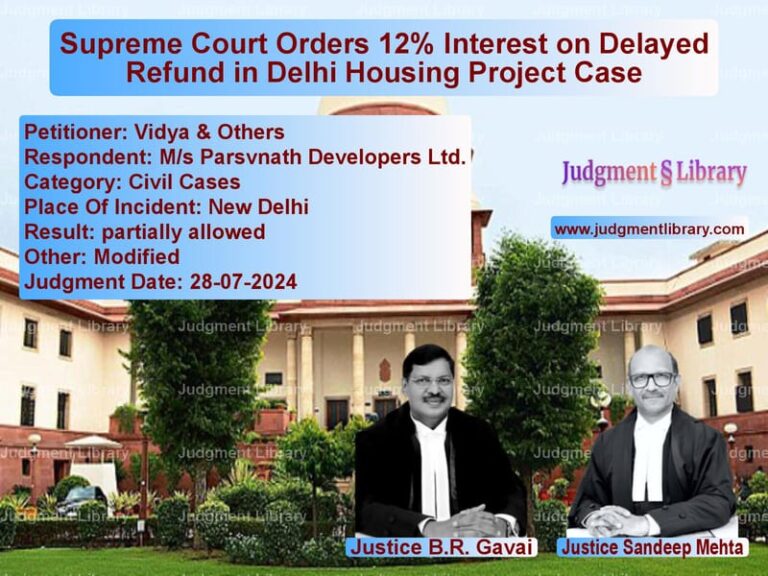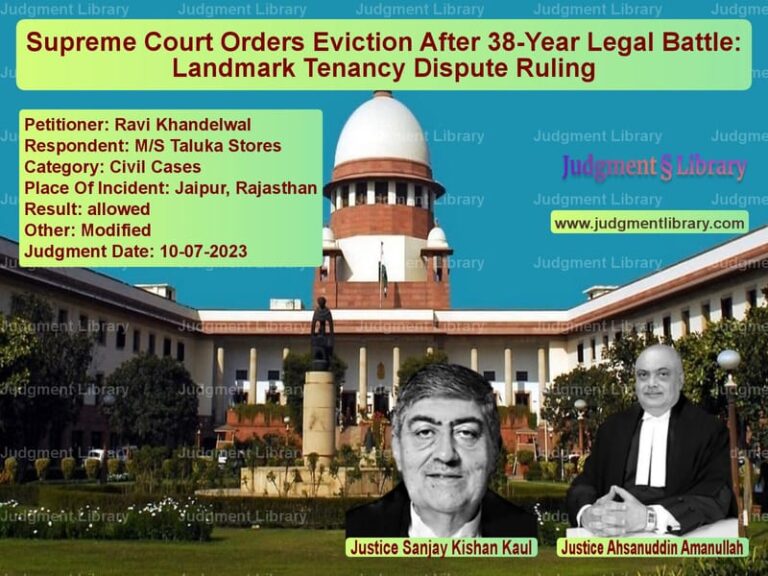Bail as a Rule: Supreme Court Grants Relief in Forgery Case
The Supreme Court of India, on March 18, 2020, ruled in favor of the appellant, Jeetendra, by granting him bail after prolonged incarceration in a case involving allegations of forgery. The case revolved around allegations that forged documents were used as a personal bond for bail in a previous matrimonial dispute. The High Court of Madhya Pradesh had rejected multiple bail applications, leading the appellant to approach the Supreme Court.
Background of the Case
Jeetendra was accused under Sections 420, 177, 181, 193, 200, and 120-B of the Indian Penal Code (IPC). The allegations stemmed from an earlier case where his wife had lodged an FIR against him under Sections 498-A, 323, and 506 IPC, alleging domestic violence. In that case, Jeetendra was arrested and later granted bail based on a personal bond furnished by his mother using documents related to their residential property.
Years later, on May 20, 2012, his cousin, Dileep Borade, and his son, Vishal Borade, lodged a complaint alleging that the property documents used for bail in the matrimonial case were forged. This led to the registration of Crime No. 210/2012, and Jeetendra was arrested on January 5, 2019, after prolonged investigation.
Legal Proceedings
First Closure Report
Following an investigation, the police filed a closure report in the case on May 24, 2013, concluding that no offense had been committed. However, five years later, on June 20, 2018, the Judicial Magistrate ordered further investigation.
Second Closure Report and Continued Detention
After additional investigation, the police submitted a second closure report on September 2, 2019, again stating that no offense had been committed and recommending that Jeetendra be discharged. Despite this, the Trial Court did not immediately accept the report, and Jeetendra’s bail applications continued to be rejected.
Petitioner’s Arguments (Jeetendra)
- The appellant had been in custody since January 5, 2019, and continued detention was unjustified given the nature of the allegations.
- The police had already filed two closure reports, stating that no offense had been committed.
- He was being wrongfully detained as the trial court had not yet accepted the second closure report.
- The charges against him, even if assumed to be true, were of a nature where prolonged incarceration was unwarranted.
- Bail should be granted as per the legal principle that “bail is the rule and jail is the exception.”
Respondent’s Arguments (State of Madhya Pradesh)
- The High Court had denied bail, considering that the second closure report was still pending acceptance by the Trial Court.
- The accused had failed to provide evidence showing that material witnesses had been examined, which was a condition imposed during previous bail applications.
- The allegations involved forgery, which is a serious offense affecting the judicial process.
- The case was still under judicial scrutiny, and granting bail would interfere with ongoing proceedings.
Supreme Court’s Observations
The Supreme Court analyzed the sequence of events and found merit in the appellant’s plea for bail. The Court emphasized that bail applications should not be decided mechanically and should take into account the principle that “bail is the rule and jail is the exception.”
The Supreme Court noted:
“There is no gainsaying that bail should not be granted or rejected in a mechanical manner as it concerns the liberty of a person.”
The Court also found it significant that two closure reports had already been filed, with the police concluding that no offense had been committed.
Final Judgment
The Supreme Court set aside the High Court’s order dated September 16, 2019, and granted regular bail to Jeetendra. The Court made its interim bail order dated November 14, 2019, absolute, directing that Jeetendra be released on bail subject to the bonds already furnished.
The Court stated:
“The High Court ought to have kept in view that ‘bail is rule and jail is exception.’ In peculiar circumstances of this case where closure report was filed twice, the High Court ought not to have declined bail only because the trial court was yet to accept the said report.”
Significance of the Ruling
This judgment reiterates the fundamental principles of bail jurisprudence in India. The Supreme Court’s ruling underscores that prolonged incarceration, especially when closure reports recommend discharge, violates personal liberty. The judgment strengthens the principle that bail should be granted unless there are compelling reasons to keep an accused in custody.
Petitioner Name: Jeetendra.Respondent Name: State of Madhya Pradesh & Anr..Judgment By: Justice S. A. Bobde, Justice B. R. Gavai, Justice Surya Kant.Place Of Incident: Madhya Pradesh.Judgment Date: 18-03-2020.
Don’t miss out on the full details! Download the complete judgment in PDF format below and gain valuable insights instantly!
Download Judgment: Jeetendra vs State of Madhya Prad Supreme Court of India Judgment Dated 18-03-2020.pdf
Direct Downlaod Judgment: Direct downlaod this Judgment
See all petitions in Bail and Anticipatory Bail
See all petitions in Judgment by S. A. Bobde
See all petitions in Judgment by B R Gavai
See all petitions in Judgment by Surya Kant
See all petitions in allowed
See all petitions in supreme court of India judgments March 2020
See all petitions in 2020 judgments
See all posts in Criminal Cases Category
See all allowed petitions in Criminal Cases Category
See all Dismissed petitions in Criminal Cases Category
See all partially allowed petitions in Criminal Cases Category







